There are many benefits to building local food systems. When people get fresh, local food, it not only improves their overall physical and mental health, but it also motivates consumers to think more about how their food is produced and its impact on the environment.
The Ceres team’s favorite projects are those where the greenhouses provide fresh food year-round to communities that would otherwise have to rely on imported produce.
“One such project we are particularly proud of is the energy-efficient aquaponics greenhouse we designed for the Potawatomi tribal community in Forest County, northern Wisconsin. The greenhouse not only provides a constant supply of fresh, nutritious greens, but also plays a critical role in advancing the tribe’s food sovereignty.”
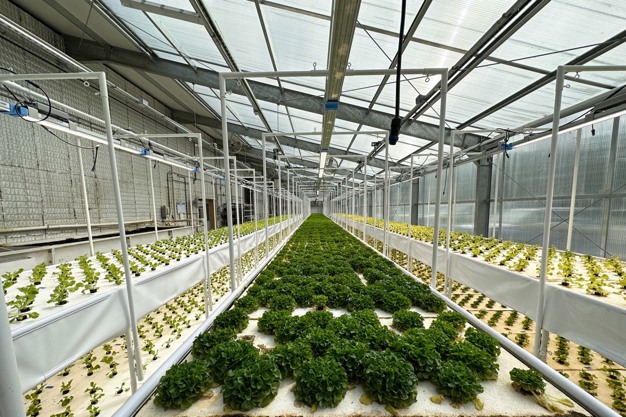
What is food sovereignty?
Food sovereignty is the right of people to access healthy and culturally appropriate food produced using ecologically sound and sustainable methods, as well as their right to define their own food and agricultural systems. “For tribal communities, food sovereignty is particularly important because it enables them to regain control over their food sources, preserve their cultural heritage, and build their economic resilience.”
In this blog, Ceres shares the success story of the Potawatomi Tribe’s aquaponic greenhouse in Forest County and shows how this solution has empowered the community, improved their food security, and set an example for other tribal communities seeking to build local, sustainable food systems.
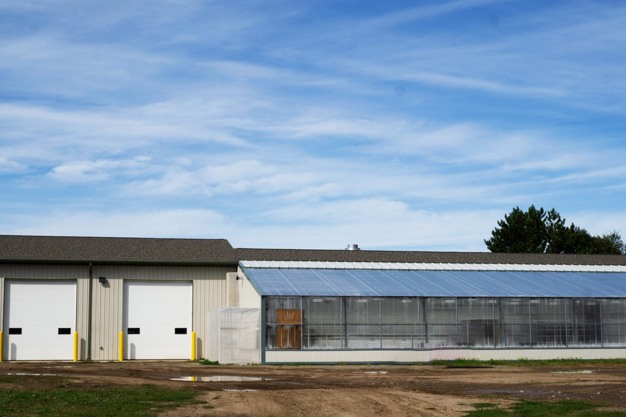
The greenhouse was connected to a facility used for food processing and distribution, storage, office space and classroom space.
The Potawatomi community in Forest County
The Forest County Potawatomi (FCP) have lived in Forest County, Wisconsin since the late 1800s, with settlements around Blackwell, Wabeno, Carter, and Crandon. Currently, the FCP are the largest employer in Forest County, with revenues from various tribal enterprises supporting investments in health, wellness, education, the environment, and the future of their community.
Bodwéwadmi Ktëgan is a farm owned by the Potawatomi of Forest County whose goal is to “provide the tribal community with a natural, sustainable source of vegetables, fruits, greens and animal proteins. All products are available to tribal members and the public.”
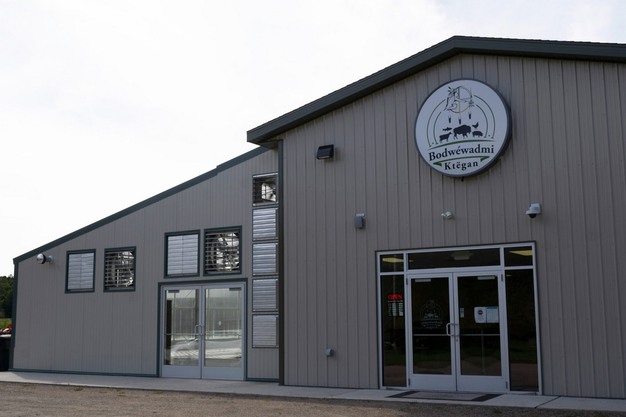
The insulated east wall of the greenhouse is connected to the farm store where you can purchase local and fresh produce, bison, beef and eggs.
Founded in the spring of 2017 on the former Red Deer Ranch in Blackwell, Wisconsin, Bodwéwadmi Ktëgan embodies the tribe’s mission to ensure its community access to healthy, sustainable food sources.
Potawatomi Farm first approached Ceres Greenhouse Solutions in 2018 with a desire for a year-round food production greenhouse that would be connected to a larger facility that includes a food processing and distribution center, cold storage, community room, farm store, and office space. Northern Wisconsin is known for its cold, gray, and snowy winters, so Ceres needed to develop a custom design that would meet the specific needs of the farm and its climate.
The aquaponic greenhouse solution
Ceres designed a 30′ x 100′ (284 m²) passive solar greenhouse made of heavy gauge steel to withstand the wind and snow loads of a Wisconsin winter.
The design includes a ground-to-air heat transfer (GAHT) system for heating and cooling, as well as triple-glazed polycarbonate pane on the south-facing roof and wall of the greenhouse to ensure maximum efficiency and durability.
The growers at Potawatomi Farms were keen to incorporate an aquaponics system into their greenhouse to achieve a more sustainable method of growing and increase the productivity of their farm. “We brought the Forest County Potawatomi together with The Aquaponics Source, our trusted partners in aquaponics systems, to bring this exciting project to life.”
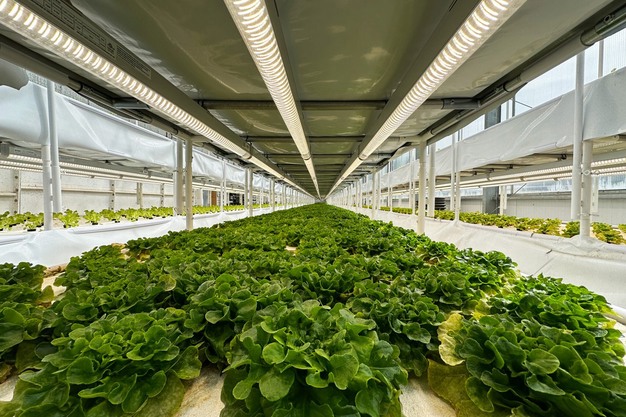
Production figures
“To properly showcase the success of The Potawatomi Farm aquaponic community greenhouse, we share the evolution of the aquaponics system setup and the resulting leafy greens production numbers.”
2019 – The original deep water culture trough setup allowed 4,700 heads of lettuce to be planted at a time. Since the time from transplanting to harvest was four weeks, the original system could produce about 60,000 per year, or 1,100 heads per week.
2023 – Due to the success of the production program and expansion to other communities, FCP decided to increase production in the spring of 2023. The original bottom-mounted deep water culture troughs were removed and replaced with three double-deck troughs. This improvement resulted in an increase of nearly 90,000 head per year, or approximately 1,750 head per week.
Ceres and The Aquaponics Source are working with FCP to launch a second aquaponics greenhouse that will produce even more leafy greens for the community. The new greenhouse will have three double-deck deep water culture troughs in addition to the fish system. This system is expected to produce about 75,000 animals per year, which equates to about 1,400 animals per week and between 800 and 1,000 pounds of fish per year.
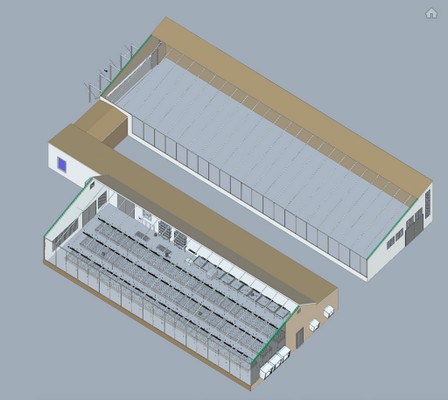
This rendering shows where the new greenhouse (bottom left) will be built in relation to the original greenhouse
Tribal Elder Boxing Program
One of the reasons FCP has increased its leafy greens production in recent years is its contribution to the Tribal Elder Food Box Program. This nonprofit initiative partners with over 30 Native and non-Native producers (including FCP) to provide food to seniors ages 55 and older from 12 federally recognized tribes in Wisconsin.
Traditional emergency foods for tribal elders, such as milk and cheese, can exacerbate existing chronic diseases and conflict with health-promoting indigenous foods. The Tribal Elder Food Box Program (TEFBP) aims to restore indigenous dietary habits and provide access to culturally appropriate, locally produced and traditional products from indigenous producers.
By selling some of its greens to TEFBP, FCP is simultaneously supporting the economic development of its community farms and indigenous food networks throughout Wisconsin.
To learn more about TEFBP, watch the video below introducing the program and all of its production partners.
Year-round solutions and food sovereignty
“Complete food sovereignty is an ambitious but worthwhile goal for most rural and tribal communities, and achieving it can be particularly challenging. However, as the Tribal Elder Food Box Program demonstrates, building a robust food network with other local communities can help achieve this goal by providing access to a diverse range of fresh and healthy foods,” says the Ceres team.
“We are honored that the greenhouse we designed for Potawatomi Farms will play a critical role in providing nutritious food to the Potawatomi community in Forest County and tribal elders across Wisconsin. This project not only supports local food sovereignty, but also sets a strong example for other communities. We eagerly await the opening of FCP’s second aquaponics greenhouse and look forward to collaborating on more community greenhouse projects in the future.”
For more information: Ceres Greenhouse Solutions
Ceres Greenhouse Solutions
(email protected)
www.ceresgs.com

